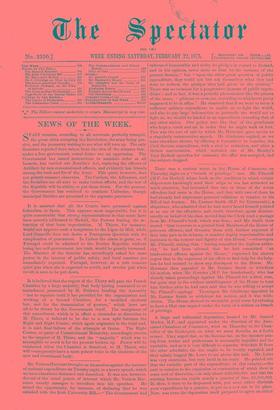There was a curious scene in the House of Commons
on Thursday night on a " breach of privilege " case. Mr. Plimsoll (M.P. for Derby), whose book on the condition in which certain shipowners knowingly send their ships to sea has attracted so much attention, had intimated that two or three of the worst offenders had seats in the House, and that with two of them he had already had unpleasant personal collisions in relation to his Bill of last Session. Mr. Eustace Smith (M.P. for Tynemouth), a shipowner, who admitted that he had never heard himself pointed at as one of the offenders, and could, therefore, speak disinter- estedly on behalf of his class, moved that the Clerk read a passage from Mr. Plimsoll's book, which was done ; and Mr. Smith then moved " that to accuse in a printed book Members of the House of grievous offences, and threaten them with further exposure if they take part in its debates, is conduct highly reprehensible and injurious to the honour and dignity of this House,"—whereupon Mr. Plimsoll, stating that, "having consulted the highest autho- rity," he had been advised that he had committed " an inadvertent offence against the House," expressed his sincere regret that in the eagerness of his effort to find help for the help. less he had seemed to show any disrespect to the House. Mr. Horsman then appealed to Mr. Eustace Smith to withdraw his motion, when Mr. Gourley (M.P. for Sunderland), who has already taken proceedings against Mr. Plimsoll for a libel, rose, but gave way to the evident unwillingness of the House to hear him further after he had once said that he was willing to accept Mr. Plimsoll's apology. Thereupon Mr. Gladstone appealed to Mr. Eustace Smith to withdraw his motion, and it was with- drawn. The House showed its invariable good sense by refusing to have a libel case argued under the form of a motion on breach of privilege.


































